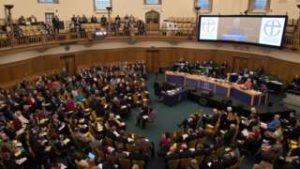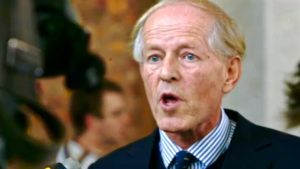 From time to time I look at the way that I seem to live in a theological world which is quite different from that inhabited by many conservative Christians. Many of the assumptions held to be normal among Christian traditionalists simply do not form any part of my theological thinking. I found myself recently glancing at one of the classic statements of conservative Protestantism. – The Westminster Confession. Although the document dates from the early 17th century, it still contains ideas that are familiar to many Protestant Christians who live today. It sets out some classic Protestant assumptions about salvation and Scripture and the way the latter is to be interpreted. We find the expression ‘that knowledge of God and of his will which is necessary to salvation’. These are not fully revealed in ‘nature and the works of creation’. The document then continues by stating that God ‘continues to declare his will unto his church… to commit the same wholly unto writing: which maketh the Holy Scripture to be most necessary, those former ways of revealing God’s will and to his people being now ceased.’ My familiarity with the historical background of this document is fairly weak but in what I have quoted we can see the inexorable logic of a Protestant way of thinking. I realise after having read it how little I can identify with its assumptions and the thrust of its thinking.
From time to time I look at the way that I seem to live in a theological world which is quite different from that inhabited by many conservative Christians. Many of the assumptions held to be normal among Christian traditionalists simply do not form any part of my theological thinking. I found myself recently glancing at one of the classic statements of conservative Protestantism. – The Westminster Confession. Although the document dates from the early 17th century, it still contains ideas that are familiar to many Protestant Christians who live today. It sets out some classic Protestant assumptions about salvation and Scripture and the way the latter is to be interpreted. We find the expression ‘that knowledge of God and of his will which is necessary to salvation’. These are not fully revealed in ‘nature and the works of creation’. The document then continues by stating that God ‘continues to declare his will unto his church… to commit the same wholly unto writing: which maketh the Holy Scripture to be most necessary, those former ways of revealing God’s will and to his people being now ceased.’ My familiarity with the historical background of this document is fairly weak but in what I have quoted we can see the inexorable logic of a Protestant way of thinking. I realise after having read it how little I can identify with its assumptions and the thrust of its thinking.
First, we may note that inherent in this document is the assumption the idea that the church writing this document has an unquestionable authority to declare the contents of the will of God. This relates to the salvation of all. If this claim is true, then we see how a single church tradition lays claim to a monopoly of knowledge of God’s will and truth. This church and its leaders can thus decide who is and who is not in his favour. Whatever my readers may think of this document -the Westminster confession, I personally find this statement to be a massive conceit. It is an attempt to accomplish a universal take-over of Christian truth. A second aspect of the extract which I find questionable is the idea that God is in any way limited by what is just found in holy Scripture. As I have said in many places in this blog, limiting God to mere words seems to imply a severe limitation on what we can experience of him in other ways. Are we really limited to experiencing God only in the language and thought forms of cultures long ago? Is there no room for other kinds of non-verbal experience? This would seem to impoverish a wider Christian culture drastically.
A third objection to the ideas of the Westminster Confession that I have is that there is an assumption that God can no longer reveal his will to people because the writing of Scripture has ceased. I find this claim, no doubt shared by many Christians, to be breathtakingly restrictive. What is there in the Bible that gives us the right to suggest that God cannot continue to reveal his will? There seems to be a fear that God might reveal something new which would disturb a cosy status-quo. It certainly gives rise to a notion that theology and doctrine are somehow fixed for all time. The immediate feeling that comes to me when writing these words is a strong feeling of suffocation. If this idea was really true, I for one would never have been able to practice as a clergyman. I need to have the understanding that the Christian theology and revelation are involved in a process of constant newness. The words of John’s gospel about the Spirit leading us into all truth, still ring true for me. This possibility of renewal and refreshment allows the faith to be always exciting and creative. Anything else has the attraction of a dungeon where there is no air and certainly no light.
In a conversation with Chris a few days ago, he asked me whether I thought that the classic evangelical conversion experience has a necessary link to the traditional evangelical beliefs. I answered that I thought that what is described as the evangelical conversion experience is a valid life changing moment for an individual. Typically a conversion experience will involve an internal crisis which might involve pre-existent guilt, stress or loss of meaning. This crisis is then in one of a variety of ways resolved and the individual is allowed to find a new perspective and beginning. There will be in Christian language a discovery of a new ‘saving’ reality, identified as the risen Christ. Words like joy, freedom and newness will describe what a convert has now found. However, when the conversion takes place in a conservative Christian setting, the liberation and experiences of the actual conversion are swiftly wedded to a dogmatic framework of belief. This dogma will include all the classic beliefs of conservative Christianity. These would involve adhering to a belief in the Bible as the inerrant word of God as well as the classic evangelical statements about the death of Christ. In answer to Chris’s question, the answer had to be that there is no intrinsic connection between the two. However conservative Christian thinking will in practice expect every convert to submit to their classic but authoritarian orthodox beliefs. The same thing is true when other classic experiential occasions come to Christians. I am thinking in particular of an encounter with the Holy Spirit. Many other cultures describe spiritual events comparable to the classic charismatic experience. The differences will be in the way that such experiences are interpreted. There is, I would maintain, no necessary fit between such an experience and the traditional Pentecostal way of interpreting it. Christian conservatives wish to colonise both these experiences of profound spiritual and emotional depth.
Christian conversion and the gift of the Holy Spirit are expressions two describe to distinctive spiritual experiences within and beyond the Christian tradition. The problem I have is that conservative Protestant theology will always seek to interpret such experiences as being their unique and exclusive possession. Thus they can be only articulated within the straight-jacket of that tradition. In this way, they are continuing the pattern of the Westminster confession. The colonisation and exclusive ownership of such distinctive Christian experiences is a way of controlling them. Ministers and pastors who think in this way are also in the same business of control, claiming authority over the text of Scripture and parishioners alike. I will always find such a power grab by clergy and others something to be resisted. I for one would not be a Christian at all if I genuinely believed, for example, that God had ceased revealing his will to the world. The liberal way of openness to new revelation and fresh insight into Scripture is something I passionately hold on to. Perhaps we need to face up to the fact that there is a considerable gulf to be found between those who think as I do and those who want to control, tie-up and restrict the will and action of God in a straitjacket. I for one wish to release newness into the Church and allow the exploration of religious experience free from a dogmatic interpretation which may have the effect of squashing and killing it.








